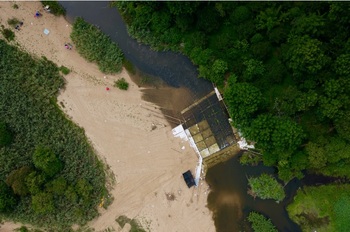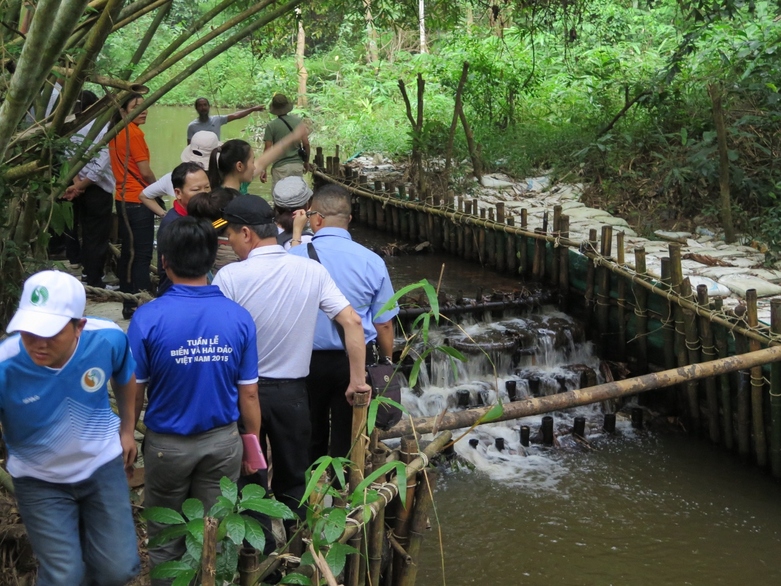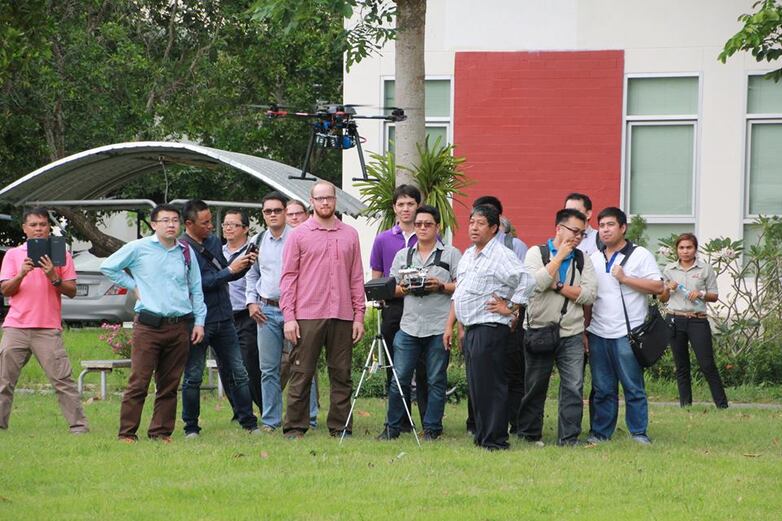Improved management of extreme events through ecosystem-based adaption in watersheds (ECOSWat)
Programme description
Title: Improved management of extreme events through ecosystem-based adaption in watersheds (ECOSWat)
Commissioned by: German Federal Ministry for Environment, Nuclear safety and Buildings (BMUB)
Country: Thailand
Lead executing agency: Department for Water Resources
Overall term: 2013 to 2016
Context
Floods and droughts are expected to occur more frequently in Thailand as a result of climate change. Local water management institutions lack the necessary technical capacities or innovative concepts for coping with these extreme events. As a result, the people of Thailand are likely to face large-scale economic losses caused by crop failures and lost production. Ecosystem services that secure and regulate the water supply, such as the use of topographical features to form natural collection tanks, present an untapped potential for cost-effective and sustainable measures of climate change adaptation and prevention.
Two pilot regions have been selected. The Huai Sai Bat watershed in the greater Chi River Basin is situated in the north-east of the country. With an area of 678 square kilometres and a maximum elevation of 550 metres, it is intensively farmed. Water scarcity is the major issue here. The Tha Di watershed in the south measures 546 square kilometres. As its highest point is 1,750 metres above sea level and the river is barely 60 kilometres in length before it meets the sea, the slopes here are very steep. In Tha Di, the biggest problem is the occurrence of (flash) flooding.
Objective
The local water departments in the Chi and Tha Di basins are appropriately qualified to plan and assess ecosystem-based adaptation measures for protection against the effects of extreme events. Lessons learned from the project have been fed into national-level adaptation strategies for the water sector.
Approach
The project operates in two pilot watersheds that are threatened by the impacts of climate change. To improve adaptive capacities in the two watersheds, the project advises experts from government bodies and universities on how to combine their knowledge, activities and sources of information. This should help them exploit synergies and improve the efficiency of water management in the respective catchment areas. At the same time, the flow of information between all involved should improve.
The involvement of the local population in stakeholder platforms ensures their inclusion in the process. These platforms are based on the existing river basin management committees.
In order to demonstrate the use of adaptation measures in catchment areas, the project is implementing innovative approaches based on the adaptation of ecosystems. This is complemented with training courses in ecosystem-based adaptation for relevant stakeholders.
Building on the experiences gained in the pilot watersheds, these approaches are fed into national strategies and policies. Similarly, education and training measures on the topic of ecosystem-based adaptation are to be integrated at the national level.
Results
The project has now extended its activities from the two watersheds (Tha Di, and Hua Say Bat) to include five further subsidiary catchment areas (Trang, Tha Pi, Lum, Pha Chi). Vulnerability studies have been completed, showing the main problems in these river basins.
Civil society has become well integrated in the water management process, with representatives playing active roles in the working groups and committees. The project has also supported several civil society initiatives, including so-called ‘living weirs’. These constructions are built on a foundation of organic matter and are fixed in place using roots from trees planted on the river banks, which also serve to strengthen the banks.
GIZ’s advice on the development of a curriculum for the study of ecosystem-based adaptation has increased the standard of education provided by the universities in this field.
The project strengthens the knowledge of the people on the ground as well as the water institutions and universities by providing training and by developing curriculum developments at an academic level. Furthermore the knowledge is shared among diverse stakeholder groups in River Basins by a peer to peer approach.
The Thai Ministry of Natural Resources and Environment now recommends the pursuit of ecosystem-based adaptation approaches in the water sector. It is integrating them in the guidelines and policies of state agencies, and has already included them in the climate change master plan.

Ausgangssituation
Als Folge des Klimawandels treten in Thailand häufig Überflutungen und Dürren auf. Den Mitarbeiten-den in den zuständigen Wassermanagementinstitutionen fehlen oft das Know-how und innovative Konzepte zur Bewältigung solcher Extremereignisse. Für die Bevölkerung Thailands ist somit mit zu-nehmend großen ökonomischen Schäden infolge von Ernteverlusten und Produktionsausfällen zu rechnen. Durch Ökosystemdienstleistungen kann das Land die Folgen solcher Extremereignisse bes-ser bewältigen. Diese kostengünstigen und nachhaltigen Maßnahmen zur Vorbeugung nutzt Thailand bislang noch nicht aus.
Ziel
Die zuständigen Behörden beugen in den Wassereinzugsgebieten Thailands vermehrten Hochwasser- und Dürre-Schäden durch die Umsetzung von ökosystemaren Anpassungsmaßnahmen vor.

Vorgehensweise
Das Projekt arbeitet in drei von den Auswirkungen des Klimawandels bedrohten Pilot-Wassereinzugsgebieten. Es berät Fachkräfte aus Behörden, Universitäten und andere Verantwortliche, ihr Wissen, ihre Aktivitäten und Informationsquellen zu bündeln. Die Zusammenarbeit erzeugt Synergien, so dass alle Beteiligten das Wassermanagement im entsprechenden Einzugsgebiet effizienter gestalten und über ein gemeinsames Informationsmanagement verbessern können.
Schon jetzt bestehen in Thailand an vielen Flüssen von den Wasserinstitutionen organisierte Managementkomitees. In diesen sind Repräsentanten der öffentlichen und privaten Hand sowie Vertreter der Zivilbevölkerung eingebunden. Das Projektteam organisiert mit den Komitees und Institutionen Austausch-Plattformen.
Zugeschnitten auf die spezifischen Bedingungen und Herausforderungen eines jeden Einzugsgebietes hat das Projektteam konkrete Anpassungsmaßnahmen zu Demonstrationszwecken verwirklicht. Es hat die Mitglieder der Komitees, Mitarbeitende aus Institutionen und der Wissenschaft zu dem Thema ökosystemare Anpassungsansätze geschult und fortgebildet. Partnerorganisationen sowie alle anderen wichtigen Beteiligten hat es in den Planungsprozess einbezogen. Traditionelle und state-of-the-art Analyse- und Planungsprozesse wurden durch den Einsatz von Drohnentechnologie innovativ ergänzt.
Ausgehend von den Erfahrungen in den Pilotgebieten werden die Ansätze der ökosystemaren Anpassung in die Entwicklung von Anpassungskonzepten auf nationaler Ebene eingespeist. Gleichzeitig sollen Aus- und Fortbildungsformate zum Thema ökosystemare Anpassung/ökologischer Wasserbau in den Projektregionen und auf nationaler Ebene verankert werden.
Wirkungen
Die zuständigen Wasserwirtschaftsabteilungen haben ökosystemare Anpassungsmaßnahmen zum Schutz vor den Auswirkungen von Extremereignissen datenbasiert und unter Einbeziehung der lokalen Bevölkerung geplant. Die Abteilung für Wasser-Ressourcen des Umweltministeriums priorisiert nun ökosystemare Anpassungsmaßnahmen in der Wasserplanung.
Eine der wichtigsten Wasserinstitutionen Thailands, die königliche Bewässerungsabteilung des Landwirtschaftsministeriums, prüft bei 20 mittleren Projekte mit einem Gesamtvolumen von mehr als 100 Millionen Euro, wie sie ökosystemare Ansätze einbinden kann.
Ein Training für „Klimawandel und ökosystemare Dienstleistungen im Wassersektor“ wurde in der Landessprache entwickelt. Die ständig steigende Nachfrage führte dazu, dass inzwischen 400 Personen aus den Wasserorganisationen und der Zivilbevölkerung das Training absolviert haben.
An der Walailak Universität wurde ein Curriculum für den Einsatz von Drohnen im Wassermanagement entwickelt. An dem ersten Kurs haben bereits 20 Studierende teilgenommen.
Es wurden sieben wissenschaftliche Aufsätze zu den Themen Drohnenanwendung, Planungsprozess und ökonomische Analysen erfolgreich eingereicht und auf internationalen Konferenzen in Australien, Südafrika, Holland und Thailand präsentiert.
